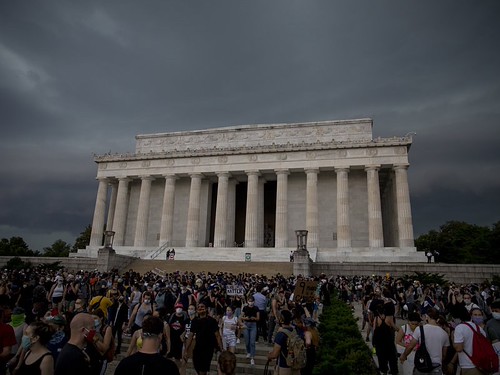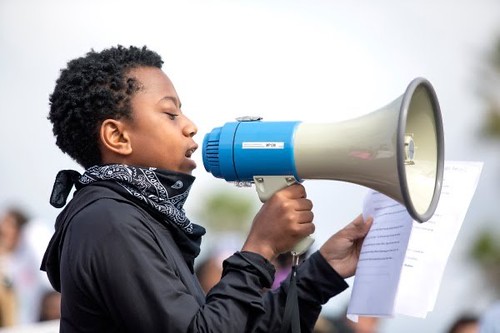Trái
: Người da đen xuống đường đòi quyền bình đẳng tại Washington, D.C.
tháng 8 năm 1963 ; Phải : Dân Mỹ biểu tình ở New York City đòi công lý
tháng 6, 2020 (Hulton Archive ; David Delgado)
Lời dịch giả : Đây
là bức tâm thư của cựu tổng thống George W. Bush gởi người dân Mỹ trong
lúc cả nước đang sôi sục sau cái chết của George Floyd.
Tâm thư của cựu tổng thống George W. Bush
Laura
và tôi đau lòng hết sức khi nhìn cảnh George Floyd bị chèn cổ một cách
dã man, cũng như rất buồn khi thấy sự bất công và nỗi sợ hãi đang làm cả
nước muốn ngộp thở. Nhưng mấy hôm nay chúng tôi vẫn cố không nói gì vì
đây không phải lúc để lên tiếng dạy đời. Đây là lúc để lắng nghe. Đây là
lúc để nước Mỹ xét lại những điều sai quấy của mình - và qua đó ta cũng
sẽ nhìn ra sức mạnh cứu chuộc cho dân tộc.
Quả
là một sự thất bại khi vô số công dân Mỹ gốc Phi, nhất là những người
trẻ, tiếp tục bị quấy nhiễu và đe doạ đến tính mạng ngay trên quê hương
của họ. Nhưng cũng là sức mạnh khi người biểu tình được các lực lượng
cảnh sát có trách nhiệm bảo vệ để họ có thể xuống đường đòi hỏi một ngày
mai tươi sáng hơn. Bi kịch này - với một chuỗi dài những bi kịch tương
tự, đề ra một câu hỏi mà lâu nay không ai muốn trả lời : Làm sao để chấm
dứt sự kỳ thị có hệ thống ở Mỹ ? Cách duy nhất chúng ta có thể nhìn
thấy chính mình trong ánh sáng của sự thật là lắng nghe tiếng kêu van
của những người đang đau khổ. Những kẻ muốn bóp nghẹt tiếng kêu đó không
hiểu nước Mỹ là gì, hoặc bằng cách nào nước Mỹ có thể trở nên tốt hơn.
Trước đài tưởng niệm Lincoln Memorial ở Washington, D.C. ngày 6/6/2020 (Tyrone Turner/WAMU)
Thử
thách lớn nhất của Hiệp Chủng Quốc Hoa Kỳ là làm sao kết hợp những con
người có nguồn gốc vô cùng khác nhau thành một đất nước của công lý và
cơ hội. Những
giáo điều và thói quen về sự thượng đẳng của giống dân da trắng mà đã
một lần suýt xé đôi đất nước vẫn còn đang đe doạ quốc gia chúng ta. Câu
trả lời cho vấn nạn của nước Mỹ nằm trong cách ta ăn ở sao cho đúng với
lý tưởng đã tạo nên đất nước này - tất cả mọi người sinh ra đều bình
đẳng và được thượng đế ban cho những quyền căn bản. Chúng ta dễ quên
rằng đó là những tư tưởng cực kỳ cấp tiến, và những nguyên lý căn bản mà
ta trân quý luôn luôn thách thức các cơ chế bất công dù do cố ý hay mặc
nhiên.
Những
người hùng xưa nay của nước Mỹ - từ Frederick Douglass đến Harriet
Tubman, từ Abraham Lincoln đến Martin Luther King Jr. - đều là những vị
anh hùng của sự đoàn kết. Thiên chức của họ không dành cho kẻ yếu tim.
Họ có khả năng làm lộ diện sự kỳ thị và bóc lột - những vết nhơ của dân
tộc mà đôi khi không dễ cho cộng đồng đa số bình tâm suy xét. Chúng ta
chỉ có thể nhìn ra nhu cầu của đất nước qua cặp mắt của người bị đe doạ,
áp bức và bỏ rơi.
Một cậu bé đọc diễn văn trong một cuộc xuống đường tổ chức cho trẻ em ngày 6/6/2020 tại Manhattan Beach. (Danielle Segura)
Giờ
đây chúng ta đang đứng trước một câu hỏi lớn. Có rất nhiều người hoài
nghi nền công lý của nước Mỹ. Và họ có lý do. Người da đen thấy quyền
con người của họ cứ bị vi phạm liên miên, trong khi các cơ quan nhà nước
thì phản ứng hết sức chậm chạp hoặc không đi tới đâu. Ai cũng biết một
nền công lý bền vững chỉ đạt được bằng những phương tiện ôn hoà. Hôi của
không là giải phóng ; tàn phá không phải là tiến bộ. Nhưng ta biết muốn
có yên bình dài lâu phải có sự công bằng tương xứng. Chế độ pháp trị
cần đặt trên nền tảng của sự bình đẳng và chính danh của nhà cầm quyền ;
công lý cho tất cả là trách nhiệm của tất cả mọi người.
Nó
sẽ đòi hỏi một nỗ lực bền bỉ, dũng cảm và sáng tạo. Khi ta hiểu được
kinh nghiệm sống của người khác, ta sẽ dễ giúp họ hơn. Muốn thương người
như thể thương thân ta phải đối xử với người khác như bình đẳng. Chúng
ta có một con đường tốt hơn - con đường của sự đồng cảm, của giao ước sẻ
chia, của hành động can đảm, và của sự bình yên dựa trên công lý. Tôi
tin rằng người Mỹ chúng ta sẽ cùng nhau chọn con đường tốt hơn ấy.
George W. Bush (Ianbui dịch)
Laura and I are anguished by the brutal suffocation of George Floyd
and disturbed by the injustice and fear that suffocate our country. Yet
we have resisted the urge to speak out, because this is not the time for
us to lecture. It is time for us to listen. It is time for America to
examine our tragic failures – and as we do, we will also see some of our
redeeming strengths.
It remains a shocking failure that many African Americans, especially
young African American men, are harassed and threatened in their own
country. It is a strength when protesters, protected by responsible law
enforcement, march for a better future. This tragedy — in a long series
of similar tragedies — raises a long overdue question: How do we end
systemic racism in our society? The only way to see ourselves in a true
light is to listen to the voices of so many who are hurting and
grieving. Those who set out to silence those voices do not understand
the meaning of America — or how it becomes a better place.
America’s greatest challenge has long been to unite people of very different backgrounds into a single nation of justice and opportunity. The doctrine and habits of racial superiority, which once nearly split our country, still threaten our Union. The answers to American problems are found by living up to American ideals — to the fundamental truth that all human beings are created equal and endowed by God with certain rights. We have often underestimated how radical that quest really is, and how our cherished principles challenge systems of intended or assumed injustice. The heroes of America — from Frederick Douglass, to Harriet Tubman, to Abraham Lincoln, to Martin Luther King, Jr. — are heroes of unity. Their calling has never been for the fainthearted. They often revealed the nation’s disturbing bigotry and exploitation — stains on our character sometimes difficult for the American majority to examine. We can only see the reality of America's need by seeing it through the eyes of the threatened, oppressed, and disenfranchised.
That is exactly where we now stand. Many doubt the justice of our country, and with good reason. Black people see the repeated violation of their rights without an urgent and adequate response from American institutions. We know that lasting justice will only come by peaceful means. Looting is not liberation, and destruction is not progress. But we also know that lasting peace in our communities requires truly equal justice. The rule of law ultimately depends on the fairness and legitimacy of the legal system. And achieving justice for all is the duty of all.
America’s greatest challenge has long been to unite people of very different backgrounds into a single nation of justice and opportunity. The doctrine and habits of racial superiority, which once nearly split our country, still threaten our Union. The answers to American problems are found by living up to American ideals — to the fundamental truth that all human beings are created equal and endowed by God with certain rights. We have often underestimated how radical that quest really is, and how our cherished principles challenge systems of intended or assumed injustice. The heroes of America — from Frederick Douglass, to Harriet Tubman, to Abraham Lincoln, to Martin Luther King, Jr. — are heroes of unity. Their calling has never been for the fainthearted. They often revealed the nation’s disturbing bigotry and exploitation — stains on our character sometimes difficult for the American majority to examine. We can only see the reality of America's need by seeing it through the eyes of the threatened, oppressed, and disenfranchised.
That is exactly where we now stand. Many doubt the justice of our country, and with good reason. Black people see the repeated violation of their rights without an urgent and adequate response from American institutions. We know that lasting justice will only come by peaceful means. Looting is not liberation, and destruction is not progress. But we also know that lasting peace in our communities requires truly equal justice. The rule of law ultimately depends on the fairness and legitimacy of the legal system. And achieving justice for all is the duty of all.
This will require a consistent, courageous, and creative effort. We
serve our neighbors best when we try to understand their experience. We
love our neighbors as ourselves when we treat them as equals, in both
protection and compassion. There is a better way — the way of empathy,
and shared commitment, and bold action, and a peace rooted in justice. I
am confident that together, Americans will choose the better way.
Statement by President George W. Bush, George W.Bush Presiential Center, bushcenter.org, 02/06/2020




No comments:
Post a Comment